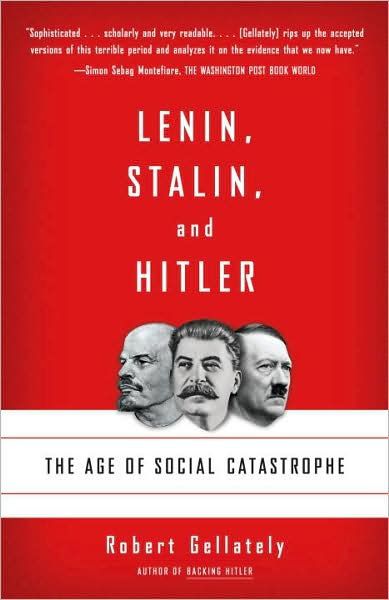Revue de presse de l'Histoire - La Seconde guerre mondiale le cinéma les acteurs et les actrices de l'époque - les périodes de conflits mondiales viètnamm corée indochine algérie, journalistes, et acteurs des médias
 A bold new accounting of
the great social and political upheavals that enveloped Europe between 1914 and 1945-from the Russian Revolution through the Second World War. In Lenin, Stalin, and Hitler, acclaimed historian
Robert Gellately focuses on the dominant powers of the time, the Soviet Union and Nazi Germany, but also analyzes the catastrophe of those years in an effort to uncover its political and
ideological nature. Arguing that the tragedies endured by Europe were inextricably linked through these dictatorships.
A bold new accounting of
the great social and political upheavals that enveloped Europe between 1914 and 1945-from the Russian Revolution through the Second World War. In Lenin, Stalin, and Hitler, acclaimed historian
Robert Gellately focuses on the dominant powers of the time, the Soviet Union and Nazi Germany, but also analyzes the catastrophe of those years in an effort to uncover its political and
ideological nature. Arguing that the tragedies endured by Europe were inextricably linked through these dictatorships.
Gellately explains how the pursuit of their "utopian" ideals turned into dystopian nightmares. Dismantling the myth of Lenin as a relatively benevolent precursor to Hitler and Stalin and contrasting the divergent ways that Hitler and Stalin achieved their calamitous goals, Gellately creates in Lenin, Stalin, and Hitler a vital analysis of
a critical period in modern history.
ISBN-13: 9781400032136
Author: Robert Gellately
Publisher: Knopf Doubleday Publishing Group
Publication date: 08/12/2008
Publishers Weekly
Historian Gellately's (Backing Hitler: Consent and Coercion in Nazi Germany) new work insists on Lenin's inclusion
in any effort to understand the two major and deadly dictatorships of 20th-century Europe, Soviet communism and Nazism. Every horrendous act of the Stalin era had been seeded by Lenin, the author
argues. Moreover, the Soviet and Nazi systems developed in tandem, each carefully eying the other, learning from each other, as they both reached an apex of brutality and terror. In developing
this analysis, Gellately provides informed but somewhat plodding accounts of the two systems. Not all of the arguments stand up to scrutiny. "In the 1930s, the struggle between Communism and
Nazism became a deadly rivalry for world domination," the author writes.
But in the 1930s Stalin cared for little beyond the Soviet Union and was hardly bent on global conquest.
Gellately's approach is relentlessly one-sided in its focus on ideology as the causative factor in history. Even the civil war that followed the Bolshevik revolution is treated as backdrop for
the implementation of ideology, rather than as an earthquake-like event that well into the 1950s shaped the thinking of Soviet leaders. Gellately is better on the Third Reich, but overall this is
an unsatisfying and uninspired history. 16 pages of photos. (Aug. 20)